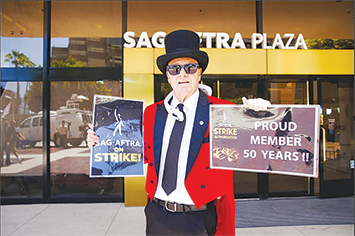Striking SAG actors in disbelief over Dystopian AI proposal
By CHEYENNE ROUNDTREE
Rolling Stone

Hollywood is officially a Black Mirror episode come to life.
That was the sentiment several members and non-members of SAG-AFTRA shared with Rolling Stone following (last) Thursday’s announcement that the 160,000-member union would join the WGA (Writers Guild of America) union on the picket lines after failing to secure a new contract with movie studio and streaming service executives.
The Screen Actors Guild and American Federation of Television and Radio Artists (SAG-AFTRA) had been negotiating with the Alliance of Motion Pictures and Television Producers (AMPTP) for the past month, but the already extended deadline expired late (last) Wednesday night. SAG-AFTRA President Fran Drescher delivered a bruising and rallying speech decrying the AMPTP’s “shameful” and “disgusting” treatment toward the union, saying, “You cannot keep being dwindled and marginalized and disrespected and dishonored.”
Both SAG-AFTRA and WGA — which has been on strike since May 2 — marks the first time since 1960 that both unions have been on strike simultaneously. One of the major points of contention for both groups has been the rapid development and implementation of AI and fears of how it could potentially replace writers and actors.
AI’S IMPACT ON TALENT
And their concern was justified, as chief negotiator Duncan Crabtree-Ireland laid bare the AMPTP’s so-called “groundbreaking AI proposal,” which holds the potential to wipe out an entire pathway to breaking into the industry, as well as a reliable source of income for many. The reported proposal hinged on the ability for background actors to be “scanned, get paid for one day’s pay” and for that company to “own that scan of their image, their likeness, and to be able to use it for the rest of eternity in any project they want with no consent and no compensation.”
“It literally was all of our worst fears confirmed when we heard that,” actress Jamie Miller tells Rolling Stone. “It’s kneecapping people from the start.”
“How can I start a career when one of those options is essentially selling my soul?” asks actor Patrick McCann.
The gravity of the consequences of AI effectively replacing background actors can’t be overstated. Background actors serve as the backdrop of busy scenes and crowd shots in film and TV projects, filling up otherwise empty restaurants, the passersby on streets, the raucous partygoers; the peripheral characters on period shows dressed in appropriate garb.
LEAD TO A FUTURE
Background work serves as a pathway for actors looking to break into the business, allowing them to learn how a set operates, meet fellow actors and industry connections, and eventually can lead to qualifying for SAG-AFTRA membership, which in turn can help land bigger roles. The daily rate for union members is under $200 a day — for days that can stretch up to 16-18 hours. Some background actors can fully support themselves with such work, while others book shows here and there to pad out bank accounts in-between gigs or seek work in other industries.
“It’s crazy, it’s wrong — it’s taking money out of people’s pockets,” says one Chicago-based actor. “The studios are getting away with one thing after another.”
“It will make it impossible to break into the industry,” Miller adds. “If you don’t have that stepping stone to get in, if you don’t have connections already and you don’t come from wealth — you start at the bottom and work your way up from background work. To eliminate that is a tragedy. Think about all of the actors that won’t be able to make it in the industry because it’s eliminating the first step.”
OWN AN ACTOR FOR $200?
The idea that studios could pay an actor less than $200 and own that person’s image forever to use in any project at any time is terrifying, several actors tell Rolling Stone, particularly when it comes to not knowing what your image is being used for.
The practice could potentially restrict how much someone can work, McCann points out. If an actor does background work for a specific company, there’s a good chance for that company to draw from its AI database and use that previously filmed footage or scanned data for another show instead of hiring that actor again — even if it’s years later. “My career has ended before it’s even started,” he says.
INTENTIONALLY STALLING TALKS
Limiting roles and opportunities for background actors would also do untold damage to other production departments, such as costume, hair and makeup, and assistant positions, as big projects often have whole teams solely dedicated to overseeing and handling background roles.
In the hours leading up to the SAG-AFTRA deadline, reports exposed the cruelty and the by-any-means-necessary approach the AMPTP was gearing up for when it came to the WGA union, with insiders saying the plan was to “let it bleed out” and not go back to the negotiating table until late October.
“The endgame is to allow things to drag on until union members start losing their apartments and losing their houses,” Deadline reported one studio executive saying.
“The major studios have made it clear that profit is their only motive in this business and that they have no problem trying to exploit the resource of background actors. It’s a disappointing time for the industry.”
(Edited reprint from Rolling Stone Magazine)
Are publishers already training AI to write books “from” best-selling authors?
By THOM HARTMANN
The Hartmann Report
SAG/AFTRA, the union I’m a member of, went on strike (last) week over studio demands to be able to “scan” an actor to put in future movies — without residuals or other pay — via AI systems (among other things).
At least one famous author has said his publisher has looked into training an AI system on his writing so it can crank out future books under his name. Things are shifting in the creative landscape, and whether this is simply a technology change or a major revision of the creative fields is yet to be seen.
RAN A TEST
I plugged “write an article about immigration in the voice of Thom Hartmann” into ChatGPT a month or so ago and got a startlingly good 500-word essay back, although it still wasn’t publication quality.
Will this become a tool used by artists and other creatives, or will it replace us? There was a time when knowing how to drive a team of horses was a highly marketable skill; then came the automobile and the gas-powered tractor. Is this analogous?
I’m not sure, but frankly find the entire scene fascinating. I’m just hoping the number of people who get left behind — like those teamsters of old — can land on their feet if things go the way they look they’re going.



Leave a Reply